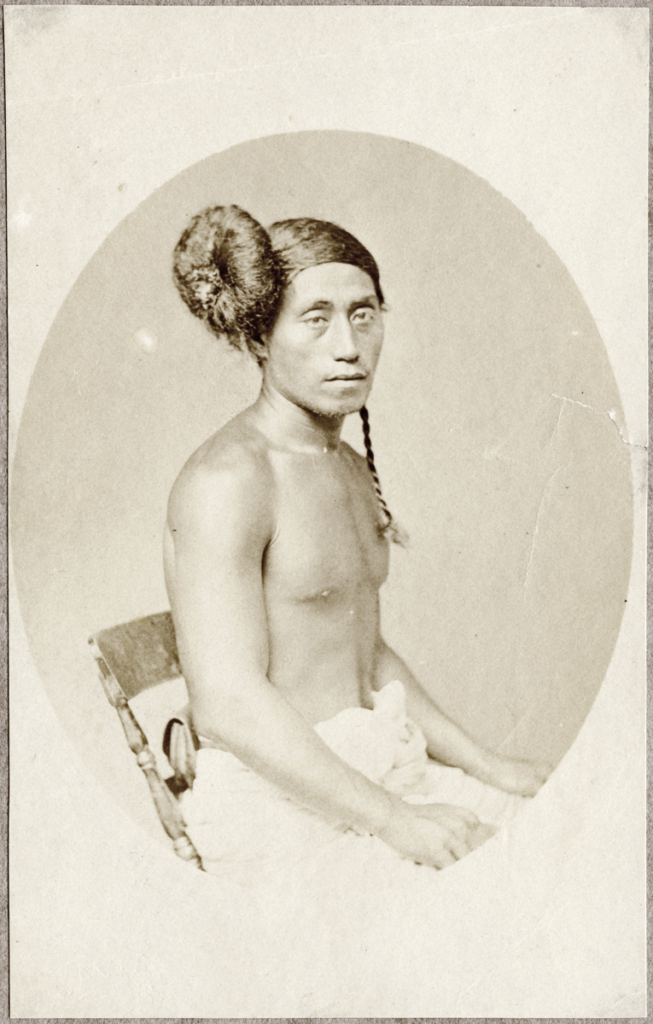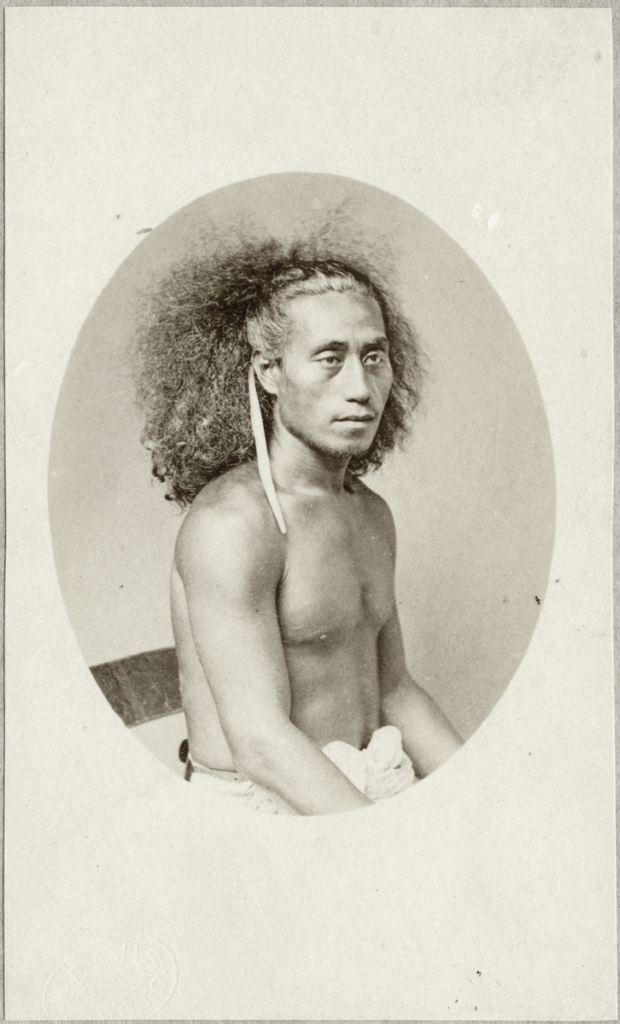In Solidarity with the Tutuilan
Decolonise History of Art contribute to University of Cambridge Museums’ ‘Museum Remix: Unheard’ challenge
In response to the University of Cambridge Museums’ (UCM) ‘Museum Remix: Unheard’ challenge, we made a compilation of reflections on the blatant colonial perspective that governs British museums. The audio and full transcript and credits are linked to at the bottom of this post.
We purposefully exceeded the brief – to respond to one of 9 works from across their collections in 3 minutes or less – to bring attention to broader decolonial issues, notably encompassing the fight for the repatriation of the Gweagal Spears to the indigenous Gweagal people of Australia.
We responded to “Man from Tutuila with hair bound [and] unbound” in the Cambridge Museum of Archaeology and Anthropology (MAA). These photographs from colonial Samoa depict a fa’afafine person, identified by their hairstyle and pose. Fa’afafine is a Samoan term that can be translated as ‘third gender’ and, according to UCM, “expresses gender fluidity and encompasses all LGBTQ+ people.”


Through their central placement, consistent pose, expression and background in both images, the discrepancy of this Tutuilan person’s hairstyle is made the focus of these photographs. While the 3/4 profile and torso-length frame is common to western portraiture, the lack of other identifiable features gives these photographs the undeniable air of an encyclopaedic entry.
The taxonomical character of these photographs is made clearer by the subjugation of of their gender to western understanding. It is clear in the Museum: Remix brief that the MAA curators know ‘man’ is not the appropriate way to describe this person, yet the reductive label remains.
This unabashed prioritising of the western gaze is the unifying feature of these photographs and the Gweagal Spears; the refusal by the MAA to return the Spears is a clear indication of this. Rodney Kelly – activist and descendent of Cooman from whom the Spears were stolen in 1770 – has stated that having the Spears returned to Australia is essential to the survival of Indigenous culture, both for the Gweagal people themselves, and for broader awareness in Australia. In prioritizing western ownership the UCM continue to stand with the colonisers John Davis (photographer) and Anatole von Hugel (collector).
Another focus of our response is UCM’s unwillingness to make lasting change in their pursuit of decolonisation. The very premise of Museum Remix allows UCM to perform a willingness to diversify the points of view it validates, without having to implement structural change to the way their insitutions operate. Our critique thus aligns with the demands of the recent open letter to UCM by Decolonise History of Art and Decolonise Archaeology, which asserts the need for:
- “Better representation and support of BIPOC employees and students;
- A UCM-wide research initiative to reveal the colonial factors behind UCM’s collections;
- Changes to the display of [UCM] collections;
- Re-evaluation of [UCM’s] approach to repatriation”
Central to the issue of structural change is that of expertise. In contrasting personal poetic and descriptive responses to Davis’ photographs with the activist expertise of Rodney Kelly, we have sought to challenge both the notion of an ‘expert’ and the premise of the exercise.
Often overlooked is the practical expertise of activists and Indigenous people themselves, such as Kelly, who has been advocating for the repatriation of the Gweagal Spears for years. The Museum Remix is rather conspicuously pitched only at the general public, and makes no mention of previous or ongoing colonial disputes it is involved in.
To be clear, opening up the collections to the interpretations of the general public is an exciting step towards anti-elitism in museums. However, when not combined with the enfranchisement of BIPOC experts that have been working towards making these stories known for decades, it becomes a poor imitation of change.
Editing by Tae Ateh; Voiceover by Izzy Collie-Cousins; Original words by Izzy Collie-Cousins & Tae Ateh; with words by Rodney Kelly, Beverly Carpenter of Oblique Arts, and protesters advocating for the repatriation of the Gweagal Spears.
Band of Protesters: Rodney Kelly (digeridoo), Banjo Nick Rambles (voice, banjo and percussion), Gene Thunderbolt McCarthy (electric guitar). Tae Ateh (ranting and percussion)
TRANSCRIPT:
PROTESTORS: (chanting) Thieves! Liars! Thieves! Liars!
Thieves! Liars!
(continuous banjo & digeridoo music)
Trinity!
VOICEOVER: Somewhere on a shelf a person sits amongst
the remnants of lives gone by, oceans away.
This trophy-case is one in a forest of many
polished, categorised silos, each made unique
by the particular uniformity of its fragments.
While eyes darting through the silence might
miss those of this Tutuilan, a moment’s
contemplation reveals our ghostly reflection
next to theirs. Their physicality is more certain
than our glass-bound reflection.
PROTESTORS: (singing during VOICEOVER)
Two hundred and forty-eight years!
Give back the Gweagal Spears!
Two hundred and forty-eight years!
Give back the Gweagal Spears!
(music & chanting stops)
BEVERLEY CARPENTER: How does it make you feel when you see this
whole museum?
RODNEY KELLY: Ah, you know, it makes me a bit angry –
because my culture’s just confined to these
little parts here from my area, and we’ve got
other different tribal stuff here from other
tribes. You look around the room and there’s
so much stuff from everywhere, and nobody’ll
ever come here to learn the true history about
these artefacts. They're just going to look at
them as spears, as wooden objects. Back home,
if we had them in our museum, I guarantee
every time somebody views them spears
they're gonna know what happened that day,
who made ‘em, and they’re actually going to
hear the story from the descendants of the
people who were there that day. So that’s
gonna be an amazing history lesson for the
many people who are gonna walk into our
museum back home and view these items.
VOICEOVER: (overlapping with RODNEY KELLY)
Without me, I’m not here, you are
Dead eyes, white lies
Don’t gaze at me
I’m not a man, I’m not an exhibit
misgendered, misplaced, mistraced
You stole me and locked me away
You cut me off and cut pieces off me and you
stand here and look at me
But I am not an object
I am not a man, I am not yours
This is not human or mineral or vegetable
I am not something you can contain or
understand without my whole presence
Without me, I’m not here, you are
Dead eyes, white lies
Don’t gaze at me
I’m not a man, I’m not an exhibit
misgendered, misplaced, mistraced
You stole me and locked me away
You cut me off and cut pieces off me and you
stand here and look at me
I’m not an object
I am not a man I am not yours
I am not, I’m not, and I’m not an object, and I’m -
VOICEOVER: What I see here is hair bound and unbound.
The fetishization of a single, defining feature
of an entire person, because the western
explorer found it strange. What we don’t see is
attention to detail in accurately representing
this person's gender. We know that they were
likely fa’afafine, and yet we still describe them -
RODNEY KELLY: (overlapping with VOICEOVER)
[…] get what they deserve because they’re
really significant items and they’re one of a
kind. They're so important to our culture and
to the survival of our culture. In a lot of areas
it is under threat. [In] some places we’re
slowly starting to regain our language and our
toolmaking processes. But something like
these spears, having them back home, they’re
gonna kickstart so much more for the public
of Australia. Everybody knows that Australia
has a lot of, the government’s got a lot of racist
policies.
VOICEOVER: (overlapping with RODNEY KELLY)
Instead, they gaze through us, as they will
have gazed through visitors many times
before. They have transgressed borders and
timelines to look at us here, the English
Channel lapping at the confines of the
photograph; the gentle slope of Samoan sand
meeting the unending expanse of ocean is a
distant and hazy memory. Ever within John
Davis’ studio, solely for the western beholder,
characterised by othered attributes that would
be familiar at home, but, here, must be singled
out in ways we can understand: they sit, and
they stare.
PROTESTERS: (singing during VOICEOVER)
Two hundred and forty-eight years!
Give back the Gweagal Spears!
Two hundred and forty-eight years,
Give back the Gweagal Spears!